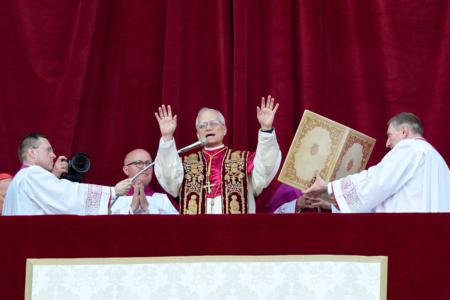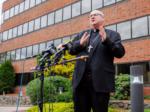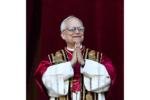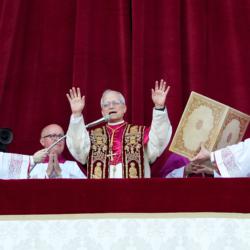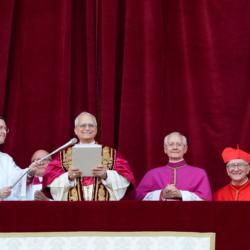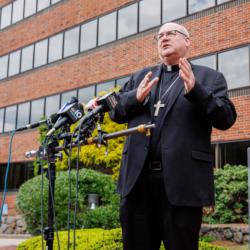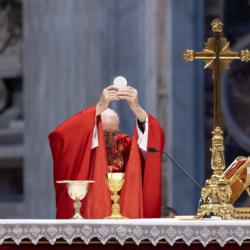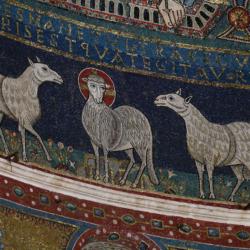Religious leaders warn of 'extremely detrimental' effects of bill to legalize assisted suicide in Scotland
(OSV News) -- The Scottish Catholic bishops have signed a public statement of protest against a bill to legalize assisted suicide in their country.
They joined the Church of Scotland -- part of the worldwide Anglican Communion -- and the Scottish Association of Mosques to object to the proposed law because it would "put pressure on vulnerable individuals" to take their own lives.
Bishop John Keenan of Paisley, vice president of the Scottish Bishops' Conference, signed the statement with the Rev. Iain Greenshields, the moderator of the Church of Scotland, and Imam Shaykh Hamza Khandwalla, of the Dundee Central Mosque, at the Scottish Parliament May 18.
The three faith groups said in their statement they "remain firm in their opposition to assisted suicide and euthanasia."
"We would call upon Members of the Scottish Parliament to consider carefully the implications of this Bill, to express their concerns, and to vote against it," the statement said.
Their intervention comes as the Assisted Dying for Terminally Ill Adults (Scotland) Bill is being drafted for introduction into the Scottish Parliament later this year.
The bill would allow competent terminally ill adults to request assistance from doctors and nurses to commit suicide.
Euthanasia and assisted suicide are currently illegal in all parts of the United Kingdom, and assisting in a suicide is punishable by up to 14 years in prison under the Suicide Act 1961.
A vigorous and well-funded campaign, driven by celebrity endorsements, is fighting for the law to be changed in all regions of the country, however.
The faith leaders said that the Scottish bill "would make it legal, in certain circumstances, to help people to commit suicide."
"Our faith traditions are united in the principle that assisted dying in itself inevitably undermines the dignity of the human person, and to allow it would mean that our society as a whole loses its common humanity," the statement said.
"We grieve with those who grieve and identify with those who suffer," it continued. "We acknowledge the sincerely held motivation of those seeking change, but do not believe that this is the correct approach to the alleviation of suffering. There is a very real danger that once legalized, these practices could put pressure on vulnerable individuals to opt for assisted suicide."
The statement added: "The ways in which similar laws in other countries are being applied, and the effect that its introduction would have on some of the most vulnerable in our society, including the disabled and the elderly, would be extremely detrimental. We are called to care for those who are suffering, not to end their lives."
On the same day, the Catholic Church in England and Wales published a written statement it submitted to a parliamentary select committee on assisted suicide, which will advise the British government on whether a change in the law is desirable.
Auxiliary Bishop John Sherrington of Westminster, the lead bishop on life issues of the bishops' conference, said: "Assisted suicide is inherently wrong and the evidence from other jurisdictions shows there can be no safe or limited assisted suicide law."
"The Catholic Church teaches that life is a gift to be cherished and cared for at all stages until natural death and that it is morally wrong to intentionally end the life of another person, including at their request," he said in a May 18 statement posted on the bishops' website.
"Arguments in support of legalizing assisted suicide are based on flawed ideas of autonomy, compassion, and 'dignity in dying,'" he said.
"Appeals for assisted suicide are often based on a false view of 'compassion' which fails to address the reality of suffering that is part of being human," he said. "Those who advocate for assisted suicide based on so-called 'dignity in dying' ultimately pass judgment on the value of human life according to its abilities rather than its inherent value.
Bishop Sherrington said a change in the law "would likely result in the dangerous degradation of people living with disabilities, effectively reducing the value of life to its physical or psychological capabilities such that those living with disabling, terminal, or progressive conditions could easily become disillusioned with their lives to the extent that they see death as preferable."
He added: "Evidence from countries where assisted suicide has been legalized demonstrates that those who seek it often report a fear of burdening their loved ones with their suffering, which is particularly concerning for those who are elderly and infirm. The fear of being burdensome would be amplified by the current health and social care crises and cost-of-living crisis."
The bishop argued that evidence from jurisdictions where assisted suicide was legal revealed that reality of the "slippery slope" toward expansive interpretations of the law.
He said that the U.S. state of Oregon, "often referenced as a model template for mild assisted suicide legislation, now allows assisted suicide for non-terminal conditions including anorexia, arthritis, and kidney failure."
"Canada, legally and culturally very similar to England and Wales, now offers assisted suicide when death is not 'reasonably foreseeable’," Bishop Sherrington said. "Belgium has expanded provision of assisted suicide to include children."- - - Simon Caldwell writes for OSV News from Liverpool, England.- - - BRIEF: EDINBURGH, Scotland (OSV News) -- The Scottish Catholic bishops have signed a public statement of protest against a bill to legalize assisted suicide in their country. They joined the Church of Scotland -- part of the worldwide Anglican Communion -- and the Scottish Association of Mosques to object to a change in the law because it would "put pressure on vulnerable individuals" to take their own lives. Bishop John Keenan of Paisley, vice president of the Scottish Bishops' Conference, signed the statement with the Rev. Iain Greenshields, the moderator of the Church of Scotland and Imam Shaykh Hamza Khandwalla, of the Dundee Central Mosque, at the Scottish Parliament May 18. The three faith groups "remain firm in their opposition to assisted suicide and euthanasia," they said in their statement. "We would call upon Members of the Scottish Parliament to consider carefully the implications of this Bill, to express their concerns, and to vote against it," the statement said. Their intervention comes as the Assisted Dying for Terminally Ill Adults (Scotland) Bill is being drafted for introduction into the Scottish Parliament later this year.
